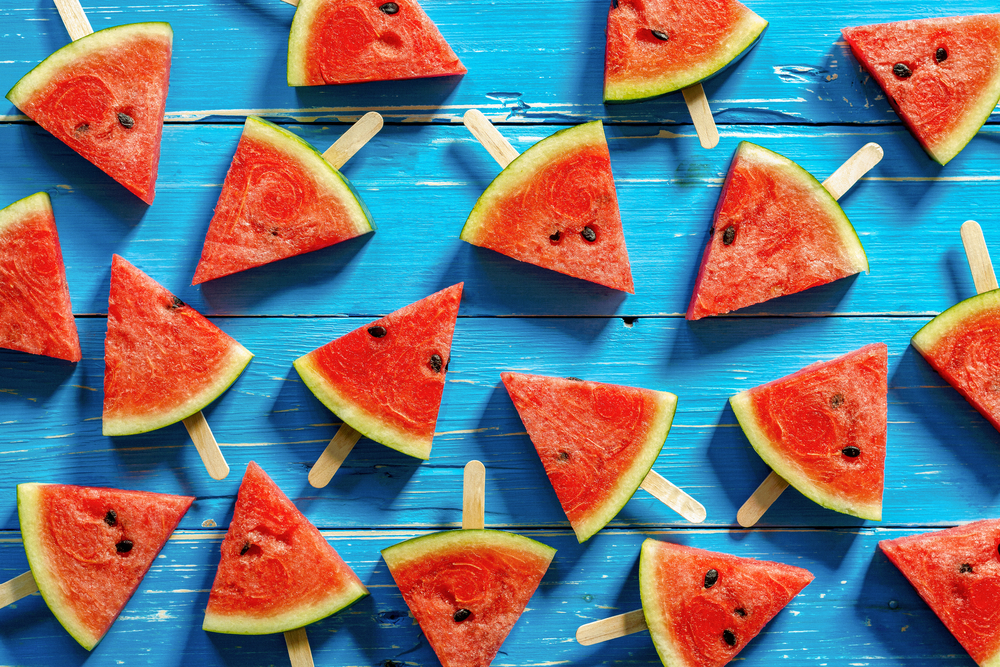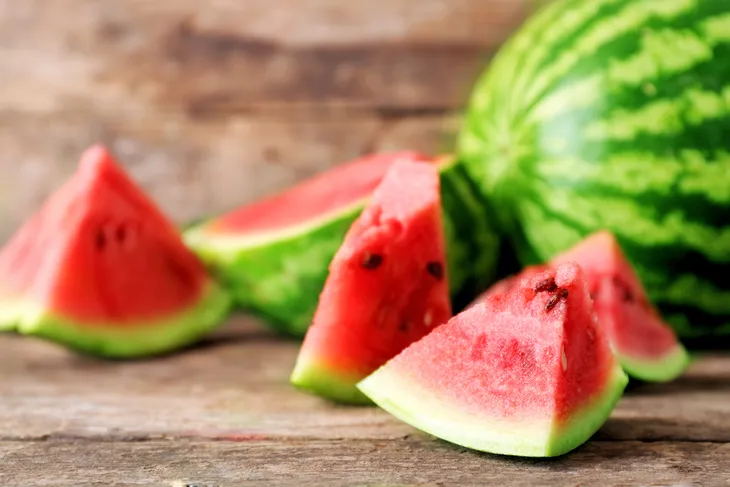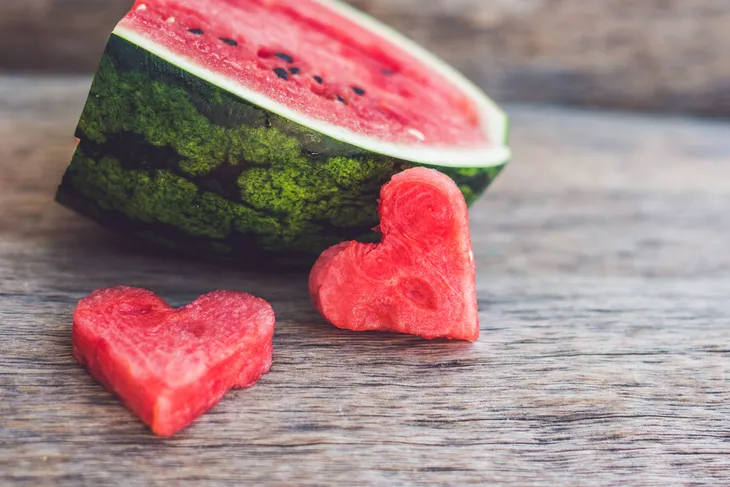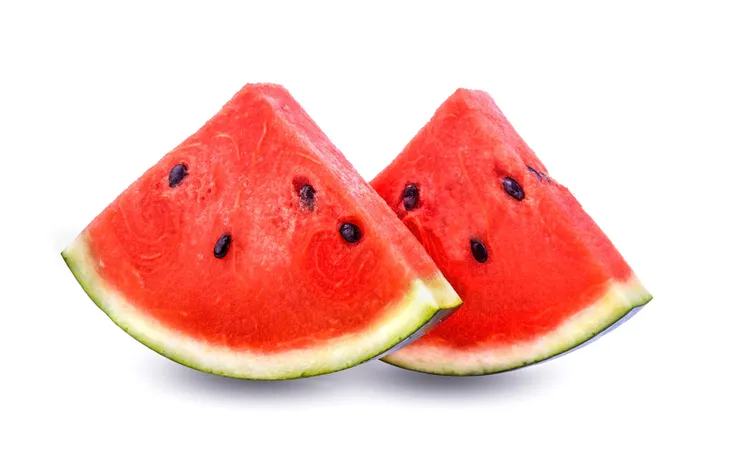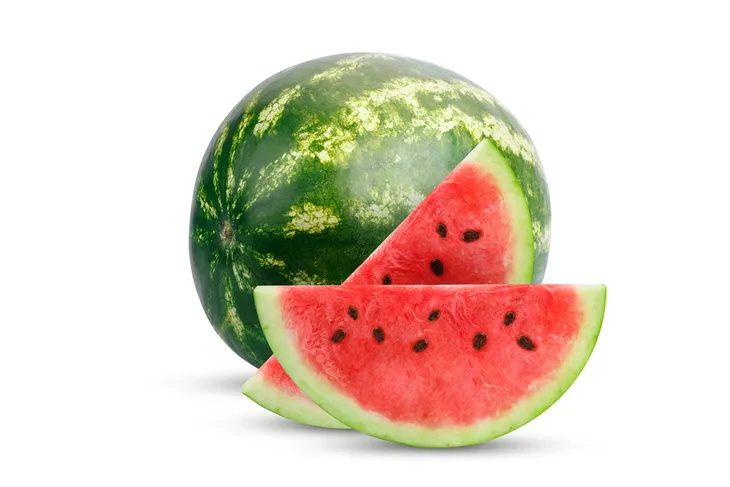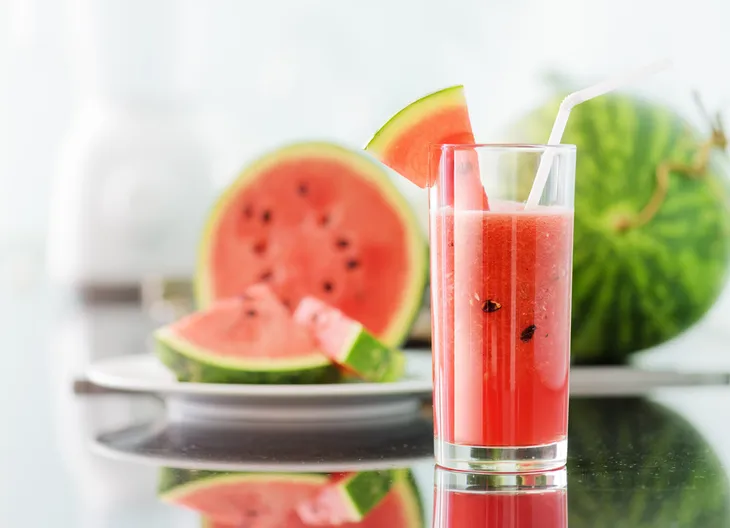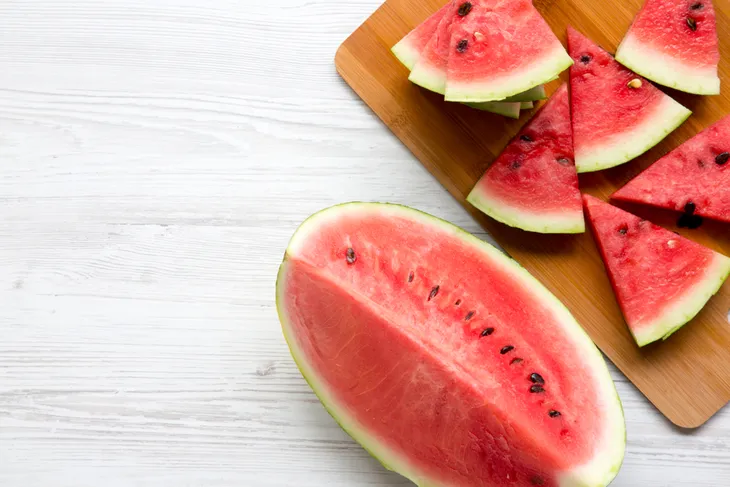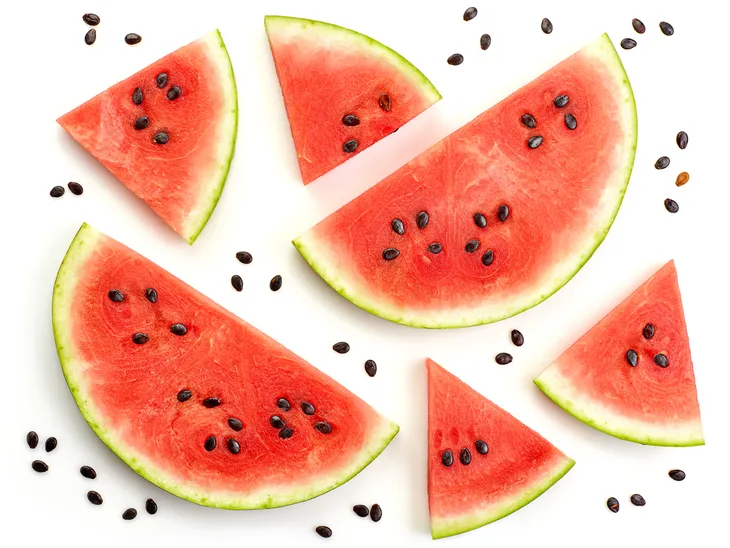Watermelon is one of those juicy, sweet fruits that everyone loves! I’ve never met someone who didn’t enjoy a slice of watermelon, especially on a hot summer day. This is mainly because even though it has a hint of sweetness, this fruit is mainly made up of water, so there’s not much to dislike.
If you’re one of those people who loves watermelon, you’re going to love it even more after you hear what we have to say! Not only is it tasty and hydrating, it’s also really good for us! Here’s a look at some of the incredible health benefits of watermelon…
Want diet & nutrition content delivered straight to your inbox? Sign up for our exclusive diet & nutrition newsletter!
Boost Immunity
Watermelon is able to boost our immune system by increasing the body’s levels of arginine. A study published in the Journal of Nutrition found that watermelon was capable of increasing levels of arginine, “an important amino acid that is used for the synthesis of nitric acid,” writes Dr. Axe. This helps dilate the blood vessels and keep the blood flowing which not only reduces the risk of high blood pressure, but also regulates the immune system.
Another way watermelon boosts the immune system is by providing vitamin C, “a key micronutrient that does double duty, acting as both an antioxidant and immune enhancer to keep your body healthy and ward off chronic disease,” writes the source. Another added bonus is that antioxidants help fight against free radicals which cause inflammation and they protect the cells from oxidative damage and stress.
Provides Skin Protection
A lot of women put a lot of care, pride, and money into taking care of their skin. To be honest, one of the best things we can do for our skin, in addition to wearing sunscreen every day, is to eat a healthy diet. Foods like watermelon are great for the skin because it contains lots of antioxidant vitamins, including A and C. According to Dr. Axe, watermelon has the “ability to protect the cells against damage and fight free radical formation to slow aging and keep your skin looking healthy.”
So what exactly do these vitamins do for us? Well, vitamin C works to boost collagen and prevent sun damage, while vitamin A maintains the wellbeing of our cells and protects them from UV damage. Healthline adds that watermelon also contains both lycopene and beta-carotene which can protect our skin from sunburns.
Good for the Heart
Watermelon helps protect the heart with its potassium and magnesium content which act as a natural remedy for high blood pressure. Even those people without high blood pressure should strive to consume plenty of these nutrients because they also protect overall heart health and lower the risk of heart disease, says Dr. Axe.
The source goes on to cite a review published in the Journal of Advances in Nutrition which “showed that eating plenty of potassium-rich foods like fruits and vegetables can positively impact blood pressure levels, which may be useful in reducing the risk of conditions such as stroke and heart disease.”
In addition to that, lycopene, a carotenoid found in watermelon “benefits heart health by reducing inflammation and improving blood lipid levels.” Dr. Axe also cites a study published in the Menopause journal which found that watermelon can “relieve arterial stiffness, balance cholesterol and improve systolic blood pressure in patients with hypertension.”
May Prevent Kidney Stones
Anyone who’s had kidney stones knows just how painful and uncomfortable they can be! These hard deposits are made up of minerals and salts that form inside the kidneys. They’re usually caused by too much calcium, oxalate and uric acid in the urine. Passing them through the urinary tract can be quite painful, but as long as they are found early, they won’t do too much damage.
Dr. Axe points out that there are some studies which have shown potassium-rich foods can help prevent kidney stones. “The potassium found in fruits and vegetables like watermelon is very helpful in cleaning toxins and washing out waste from the blood, helping to prevent kidney stones,” writes the source.
In addition to its potassium content, watermelon is also known to be a natural diuretic, “meaning it helps to increase urine production to transport waste and toxins out of the body to protect against kidney stones.”
Good for Vision
In order to ensure good vision, our body needs to consume beta-carotene, vitamin A, vitamin C, lutein and zeaxanthin. Luckily, all of these can be found in watermelon. “Studies have shown that a serious vitamin A deficiency, for example, can lead to macular degeneration, a condition characterized by the thickening of the cornea that could eventually lead to blindness,” writes Dr. Axe. One of the best food sources of beta-carotene (a form of vitamin A) is watermelon. “Getting enough beta-carotene in your diet can aid in the prevention of macular degeneration, the leading cause of age-related blindness.”
Another necessity for good eye health is lycopene because according to Healthline, it helps protect against oxidative damage, inflammation and may even prevent age-related macular degeneration (AMD). “Lycopene role as an antioxidant and anti-inflammatory compound may help prevent AMD from developing and getting worse,” writes the source.
May Prevent Prostate Cancer
Anything that helps prevent cancer is a friend of ours. While there is no cure for cancer, sometimes there are things we can do to help protect ourselves and reduce our risk. Eating more watermelon is one of the ways to do this because it’s loaded with healthy antioxidants. This summertime sweetness contains lycopene, “one of the main carotenoids found in watermelon, [which] has been linked to a lower risk of prostate cancer in some studies, making it’s cancer-fighting abilities are one of the most important watermelon benefits for men,” writes Dr. Axe. There is also research that shows lycopene can help cells keep their membrane strong so they can protect themselves from the toxins that cause cell death or mutation, says the source.
Another way watermelon is great for reducing the risk of cancer is because it’s high in vitamin A and C. Both of these antioxidants “fight free radical damage and prevent DNA mutation to block the formation of cancerous cells. Studies have also shown that high doses of vitamin C can enhance the cancer-fighting effects of certain drugs used in chemotherapy while also reducing adverse side effects of traditional cancer treatments,” explains the source.
Provides Hydration
As we’ve already mentioned, watermelon is mostly made up of water which means it’s a really hydrating food. While drinking water is the best way to stay hydrated, watermelon is about 92-percent water which means it can have a similar effect as water, says Healthline.
In addition to helping our body stay hydrated, watermelon’s high water content helps keep us feeling full so we are less prone to snacking and overeating throughout the day. The high water and fiber content keep us feeling full while still eating and keeping our calories down. That’s a win-win-win right there!
Help Detox the Body
Watermelon has a crazy amount of water content (hence the name, watermelon). In fact, it’s estimated that this melon is 91-percent water! Its high water content has several great benefits, one of those is that it’s great for detoxification. The water helps “rid the body of excess water and fluids, relieving uncomfortable bloating and swelling,” writes Dr. Axe.
Another reason watermelon is good for detoxification is because it contains potassium and magnesium. “Potassium acts as an electrolyte and promotes circulatory health while also helping to manage blood flow and hydration levels within the body, allowing oxygen to reach your cells. At the same time, magnesium reduces water retention in the gut to beat bloating and help you lose water weight,” explains the source.
Aid Weight Loss
As we previously discussed, one of the best benefits of watermelon and the reason it tastes so light and fresh is because it’s mainly made up of water which means it’s low in calories. Even with all those rich nutrients and minerals, 1-cup of watermelon only amounts to about 46-calories which makes it an amazing weight loss food. It encourages weight loss by “promoting satiety and curbing cravings to keep you on track towards your health goals,” writes Dr. Axe.
You’ll see the most weight loss results if you pair this snack with a regular workout routine. In addition to being low in calories, “watermelon has been linked to enhanced muscle recovery in athletes, helping you hit the gym more effectively to reach your weight loss goals.”
Help Relieve Pain
We all suffer from those natural aches and pains whether it be from sitting too much or working out a little too hard in the gym. A massage is usually the go-to for this kind of pain relief and muscle soreness, but you can also find some relief by eating the right foods, like watermelon. Dr. Axe cites a study published in the Journal of Agricultural and Food Chemistry which looked at how watermelon juice affects athletes. The findings showed “after 24 hours of supplementation, athletes experienced improved heart rates that were more beneficial for muscle recovery in addition to less overall soreness and muscle aches.”
Watermelon juice also contains vitamin C which can “protect cartilage and bones, aid in the repair of tendons and ligaments and help speed up wound healing,” writes Dr. Axe. Other beneficial nutrients are potassium and magnesium which help with muscle recovery and pain relief. “Potassium in particular, aids in the prevention of muscle cramps following exercise and helps you heal from injury more quickly.”
May Reduce Inflammation
Inflammation can lead to chronic disease, so it’s important we do everything we can to limit it. Thankfully, eating watermelon might help “lower inflammation and oxidative damage, as it’s rich in the anti-inflammatory antioxidants lycopene and vitamin C,” writes Healthline.
The source goes on to cite a 2015 study on rats which found that those who were fed watermelon powder as a way to supplement an unhealthy diet had “lower levels of the inflammatory marker C-reactive protein and less oxidative stress,” than those in the controlled group.
Prior to this study, Healthline writes that there was a human study which examined people who were given lycopene-rich tomato juice with added vitamin C. The results in this study also found inflammation markers to go down and antioxidants to go up. What does watermelon have in common with tomato juice? Well, watermelon also contains lycopene and vitamin C, so it could potentially provide the same benefits.
Relieve Acid Reflux
This health benefit can be derived from most melons which of course includes watermelon. As a member of the GAPS diet, this fruit is able to reduce the symptoms of acid reflux because it’s able to reduce inflammation which helps soothe most digestive issues. “Melon is believed to soothe the gastrointestinal tract and regulate pH levels while also lessening inflammation and acid production throughout the body,” writes Dr. Axe.
Improve Digestion
The best foods for us are the ones that not only encourage our body to function, but can also improve its function! Watermelon is one of those amazing foods that can actually improve our digestion. This is because it contains lots of water and some fiber, both of which work together to promote normal bowel movements.
Healthline writes, fiber “can provide bulk for your stool, while water helps keep your digestive tract moving efficiently.”
